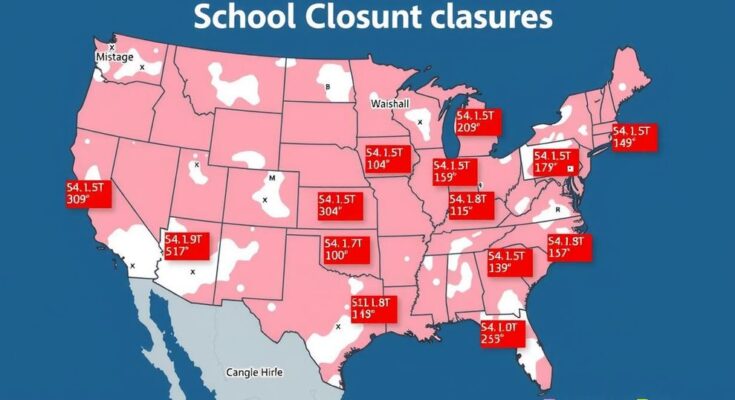Winter storms are affecting the Southern U.S., leading to widespread school closures and travel disruptions. Classes were canceled for over a million students in Texas and other states, while the adverse weather is causing flight cancellations and travel delays. Emergency preparations are in place to combat hazardous road conditions and ensure public safety amidst icy weather.
Temperatures across the Southern United States are expected to plunge as winter storms bring freezing rain and snow, prompting numerous school closures and disruptions from Texas to Georgia. In anticipation of hazardous conditions, Texas schools canceled classes for over a million students, while similar actions were observed in Kansas City and Little Rock. With travel delays already affecting hundreds of flights in Dallas, emergency services were deployed to mitigate risks associated with the harsh weather, which is anticipated to cause slick roads and travel difficulties leading into the weekend. Besides the chilling weather, regions are also bracing for a rare occurrence of winter wildfires in parts of California, presenting a stark contrast to the freezing conditions experienced elsewhere.
Governors and local officials swiftly responded to the approaching storm. In Dallas, preparations included treating roadways for anticipated snowfall, with forecasts predicting up to 5 inches in northern areas close to Oklahoma. Over the upcoming days, the storm system is expected to reach as far as Virginia and North Carolina, with potential snow accumulations impacting the southern coast. The situation is further complicated in Richmond, Virginia, where a boil-water advisory is currently in effect due to a storm-related power outage affecting the water reservoir system.
The winter storm impacting the Southern United States is the result of a polar vortex, which typically circumnavigates the North Pole but occasionally shifts southward. Such extreme weather events are believed by some experts to be increasing in frequency due to climate change. This particular cold snap has coincided with unusual January wildfires in California, highlighting the diverse effects of current weather patterns. The snow and icy conditions are particularly concerning for agriculture, with significant repercussions for farmers and livestock in affected regions, including Kansas and northern Florida, as they preemptively manage the threat to crops and water supply for livestock.
In conclusion, sweeping winter storms are causing significant disruption across a broad stretch of the Southern United States, highlighted by school closures and travel delays. Preparations are underway to manage hazardous conditions, with state and local governments mobilizing resources to address the challenges presented by extreme winter weather. As these storms progress, communities will need to remain vigilant in navigating the risks associated with icy conditions and the ongoing impacts on essential services, such as water supply and agricultural operations.
Original Source: spectrumlocalnews.com




